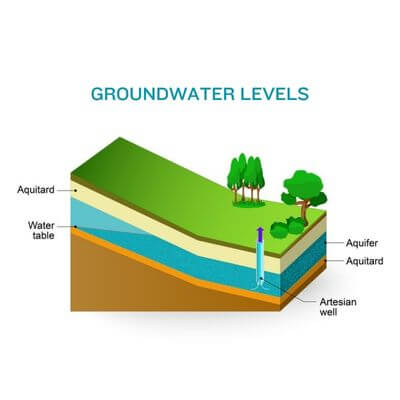

Over extraction of groundwater(groundwater depletion is a serious environmental issue. Due to irregular climate, increased agricultural use, increased population, and water pollution results in significant losses of habitat and biodiversity. According to the National Aeronautics and Space Administration (NASA) of the United States, groundwater in the northern part of India has declined by 88 million acre-feet over the past few years. It occurs when the rate of pumping exceeds the rate of natural recharge and can have significant and far-reaching impacts on the quantity and quality of groundwater.
In this article, we Discover What are the Impacts of Over Extraction on Groundwater Levels, including the effects of aquifer depletion, reduced streamflow, land subsidence, and ecological disruptions. Furthermore, we learn how saltwater intrusion and deteriorating water quality pose risks, impacting agriculture, communities, and economies. Uncover the importance of sustainable groundwater management to mitigate these impacts and ensure the long-term health of vital water resources.
Excessive pumping can lead to a decline in the groundwater table within aquifers and cause wells to no longer be able to reach groundwater. If water is continually pumped out without sufficient replenishment, aquifers become depleted, impacting the overall storage capacity of Groundwater Levels.
Land Subsidence happens when there is less support below ground. Often this is caused by overuse of groundwater when the soil collapses, compacts, and drops. This can result in the sinking of the land surface, causing damage to infrastructure like roads, buildings, and agricultural structures
Increasing cost is one of the Impacts of Over Extraction on Groundwater Levels. To elaborate as the water table lowers, the water must be pumped farther to reach the surface, using more energy. Moreover, in extreme cases, using such a well can be expensive.
Over extraction on Groundwater Levels can negatively impact ecosystems that highly depend on groundwater sustenance. It involves springs, Wetlands, and other habitats that may suffer, affecting the flora and fauna that rely on a stable water supply.
We know that both Groundwater and surface water are connected. But when the groundwater is overused it negatively impacts lakes, rivers, and streamers that are linked to groundwater and can also diminish their supply lead drought, environmental issues, and global warming.
Overpumping in coastal areas can cause saltwater to move inland and upward, resulting in saltwater contamination of the water supply. Particularly this phenomenon is problematic for coastal communities that depend on freshwater for drinking and agriculture.
Usually, Over Extraction on Groundwater Levels is linked with agricultural water use. If groundwater is less it can affect the availability of water for agriculture activities, potentially decreasing crop yields and harmful impacting the livelihoods of farmers.
Depletion of groundwater resources can have a destructive impact on social and economic implications. Because of increasing Over Extraction on Groundwater Levels, communities who are heavily rely on groundwater may suffer from water shortage, impacting daily life activities, industries, and overall economic growth.
Lower groundwater levels are a negative outcome of the increased concentration of contaminants as there is less water available to dilute pollutants. This can lead to the deterioration of groundwater quality, posing risks to human health well being, and the environment.
The negative Impacts of Over Extraction on Groundwater Levels are increasing day by day to overcome this problem here are the best 10 ways to increase groundwater levels:
1. Growing more vegetation like trees, grasses, and bunds can enhance. groundwater.
2.. Great efforts should be made to 'harvest' rainwater.
3. Protect wetland areas as they play a vital role in groundwater recharge through water storage and slow release.
4. Implement regulations and sustainable management practices to control the over extraction of groundwater.
5. Use flood irrigation as compared to drip irrigation.
6. Avoid cemented furrows for both irrigation and sewage water
7. Efforts like 'watershed development projects' should be implemented in cities.
8. Small bunds can be built across streams to stop the flow of water.
9. Avoid planting those tress that need more water for growth.
10. Manage stormwater to overcome runoff and encourage infiltration. It includes several techniques such as retention ponds, swales, and green infrastructure.
For more details, please click Metacorp





We are the pioneers in offering environmental consulting services to our patrons, giving us the first mover advantage & keeping us ahead of our competitors.
Very experienced in filing, monitoring & submission of CDSCO Compliances, Drugs Manufacturing & sale guidelines, Environmental Impact Assessment, AERB consulting services, Pollution Control Board CTE & CTO Advisory Services, Waste Management Authorization from State Pollution Control Boards, Fertilizers & Insecticides Manufacturing, Wholesale & Import Compliances
